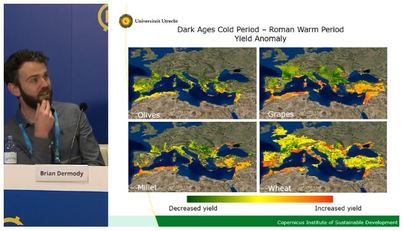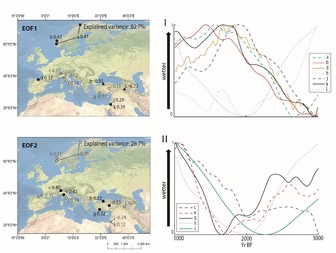
The European Geosciences Union conference takes place every year in Vienna. It hosts around 15,000 scientists on all topics to do with geoscience. This year I was invited to take part in one of the daily press conferences they organise. The topic of the press conference was Past civilisational resilience and collapse.
 Figure 1. Long term changes in rainfall over the Roman Empire (Dermody et al. 2012)
Figure 1. Long term changes in rainfall over the Roman Empire (Dermody et al. 2012) I was discussing exciting on-going work we are doing at the Copernicus Institute to understand how climate change during the Roman Period impacted that civilisation's food supply. As I outline in the video, the Romans used irrigation and trade to buffer against changes in yields associated with climate variability. What we set out to understand is how effective these methods were at providing them with resilience to longer term climate change typical of Holocene period (Fig. 1).
Sudden climate change and the Mayans
Kees Nooren from the physical geography department at Utrecht University was also present at the press conference. He was talking about recent work being done to understand the impact that volcanic eruptions had on the Maya civilisation of the 6th century. He explained the very interesting results they have that dates the eruption El Chichon to the same time as the Mayan Hiatus in 540AD.
Lessons for our society?
But what is the use of looking at the impact of climate on societies that are now long gone? We believe that by studtying these past societies we can gain an understanding of the long term implications of their interactions with their environment. In doing so, we learn something about what types of practices are sustainable and what can lead to long-term and unexpected problems. In addition we can contrast how past societies adapted to sudden changes in climate as opposed to longer term changes.
More Information
The press conference was well received and resulted in some nice media coverage in IOP Science and New Scientist. If you want to hear more from the press conference follow this link. I was the first speaker up and I also field a question at 38 mins.
 RSS Feed
RSS Feed
